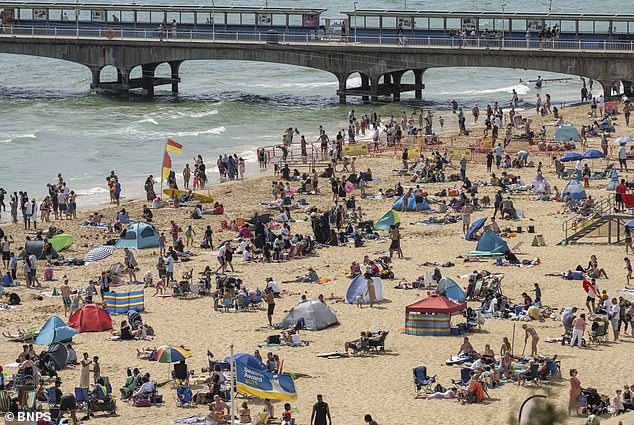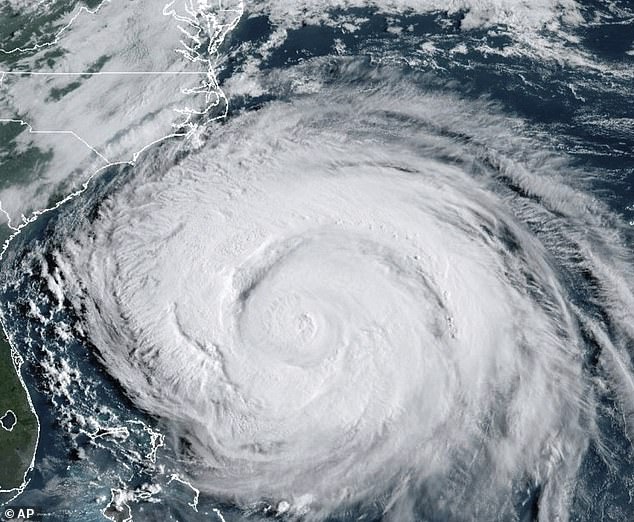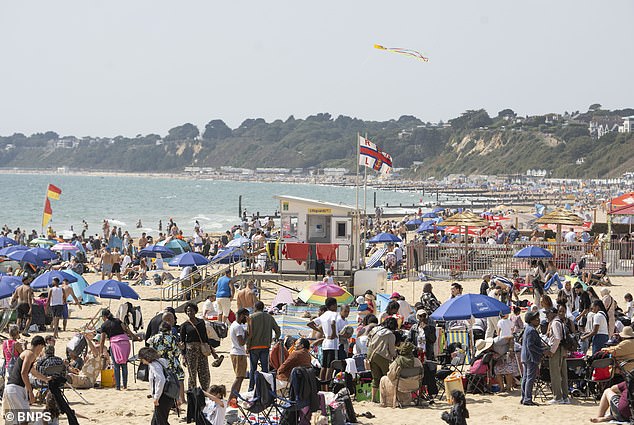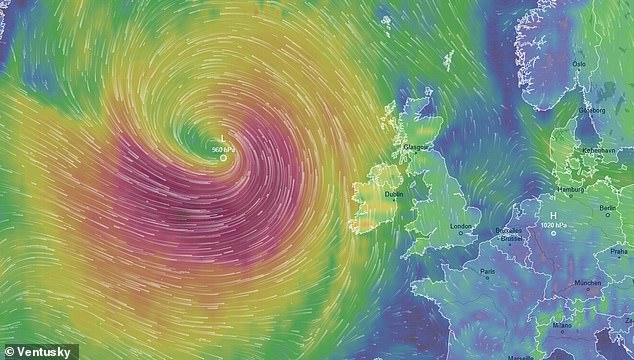Huge waves created by the remnants of Hurricane Erin risk putting holidaymakers in peril as they flock to beaches in Cornwall today to enjoy record heat.
Thousands of sun-seeking Brits will be making their way to beaches and beauty spots across the country today in what is set to be the hottest August Bank Holiday in six years.
However Hurricane Erin could see huge waves crashing into Britain in the coming days as the huge US storm barrels across the Atlantic.
It has sparked warnings from Coastguards in the south west that children could be ‘swept out’ to sea in the harsh conditions.
James Instance, HM Coastguard Divisional Commander, said: ‘Conditions in the Atlantic are predicted to mix with high tides to raise the risk in areas which are expected to be busy with visitors during the holidays.
‘There is the likelihood of strong waves and currents which could lead to people being swept out, particularly children or vulnerable people.’
The RNLI has also urged people to stick to lifeguarded beaches and take caution when entering the water.

A visitor uses an umbrella to shield from the sun in the sunflower fields at Becketts Farm in Wythall today

Sunflower fields in the August sunshine in Wythall, Worcestershire today

Thousands of people pack the beach in Bournemouth on Sunday as holidaymakers enjoy the scorching sunshine and cloudless blue skies

Hurricane Erin (pictured) could see 16ft waves crashing into Britain in the coming days as the huge US storm barrels across the Atlantic. The storm underwent a ‘remarkable’ 24-hour transition from a tropical storm to a 160mph Category 5 ‘monster’ last weekend

Temperatures over 28.2C would make Monday the second hottest late August Bank Holiday since it began 60 years ago. Pictured: Bournemouth Beach on Sunday

The remnants of Hurricane Erin seen on a weather map as it approaches the west coast of Ireland
Mr Instance added: ‘Tides will also reach higher than usual with the chance of people being cut off and trapped.
‘It’s very easy to be caught out, even in normal conditions, so we’re advising people heading to the coast just to take extra care over those three days.
Despite the danger, thousands of holidaymakers are still likely to head to Cornwall and other beaches across the UK to enjoy the heat.
The sunshine has come from a 400-mile wide ‘Spanish sizzle’ as heat from 44C Spain arrives in the UK.
Even northern areas of the country could see highs of 26C later today, one degree higher than the Moroccan capital Rabat.
Temperatures over 28.2C would make today the second hottest late August Bank Holiday since it began 60 years ago in 1965, and the hottest for six years, since 2019’s record 33.2C, Met Office records showed.
The highest number of cars of the weekend is due on the roads today as the best weather of the weekend triggers up to 10 million more Brits taking last-minute day trips, VisitEngland data showed.
Trippers will clash with millions of staycationers heading home this afternoon (Mon) at the end of the long weekend.

Sunshine is set to delight a million Notting Hill Carnival revellers this Bank Holiday Monday
A coastguard team in Boscastle, Cornwall has also issued a warning to visitors about the potential of large waves and high water levels.
A spokesperson said: ‘Visitors to the south-west coast are being advised to take extra care next week as strong swells are forecast to affect parts of the coast of Cornwall, Devon and south Wales.
‘Storms in the Atlantic and spring tides are likely to combine to generate large waves as well as higher than usual water levels from late Monday afternoon (25 August) into Wednesday (27 August).
‘Follow our simple guidance to ensure you have a fun day and come home safe: Swim at a lifeguarded beach if you can, and pay attention to the flags, check the tide times and keep an eye on the sea state, if the sea is rough.
‘Consider taking a dip on a calmer day, carry a charged-up mobile phone in case you need to call for help and if you see an emergency by the coast, call 999 and ask for the Coastguard.’
The risky conditions are set to continue into Tuesday, where waves of up to five metres could hit the Cornish coast.
A forecast on surf-forecast.com said the swell could be so powerful in St Ives it won’t be possible to surf as the ‘break may be maxing out’.
A Met Office forecaster said: ‘The remnants of ex-Hurricane Erin will see a band of rain, which could be heavy, pushing over the UK, displacing our settled weather and bringing more spells of rain and perhaps strong winds in places by midweek.’
The RNLI has warned that the conditions could become dangerous for anyone entering the water later this week.
Chris Cousens, RNLI water safety lead, said: ‘We want people to enjoy the bank holiday and stay safe, and with this unusually big surf forecast for this time of year likely to peak later in the bank holiday weekend and early next week, it’s important for people to be aware so they can keep themselves and their families safe.
‘Big surf means greater risk from rip currents, and the swell also coincides with spring tides, which means more powerful tidal water movement at greater speed.
‘The forecast is changeable, so things might look different over the next couple of days.

A participant ahead of the Notting Hill Carnival celebration in west London today

Revellers take part in the Notting Hill Carnival in the sunny conditions in London today

Participants get ready to perform during the Notting Hill Carnival adults parade

A costumed reveller arrives to take part in the parade later today
‘But we do know that with the current forecast for bigger waves building and arriving towards the end and the day after the August bank holiday weekend, beaches are likely to be busy with holidaymakers and locals.
‘Some places could see bigger waves building through the weekend too.
‘We always advise people to visit a lifeguarded beach where possible – but we also appreciate people will be out on the coast where lifeguards are not present.
‘Rip currents are powerful channels of water that become more powerful in larger surf.
‘They are also found around river mouths, estuaries and man-made structures like piers and groynes.
‘Our rip current advice is the same whether you are at a lifeguarded beach or not. If you find yourself caught in a rip current don’t fight against it or you’ll get exhausted.
‘If you can stand, wade back to shore, or swim parallel to the beach until you’re free of the current, then return to the beach. Alternatively, if you can’t do either of those or are becoming exhausted, Float to Live to preserve your energy and then wave and shout for help.’












